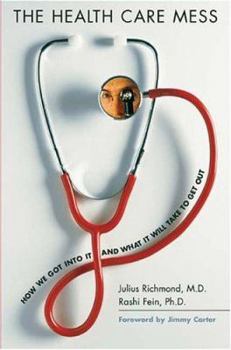The Health Care Mess: How We Got Into It and What It Will Take to Get Out
Select Format
Select Condition 
Book Overview
If we can decode the human genome and fashion working machines out of atoms, why can't we navigate the quagmire that is our health care system? In this important new book, Julius Richmond and Rashi... This description may be from another edition of this product.
Format:Hardcover
Language:English
ISBN:0674019245
ISBN13:9780674019249
Release Date:September 2005
Publisher:Harvard University Press
Length:307 Pages
Weight:0.40 lbs.
Dimensions:1.1" x 5.8" x 8.6"
Related Subjects
Administration & Medicine Economics Administration & Policy Health Health Care Delivery Health Policy Health, Fitness & Dieting Health, Fitness & Dieting Medicaid & Medicare Medical Medical Books Politics & Government Politics & Social Sciences Public Affairs & Policy Religion & Spirituality Social Sciences Social Services & Welfare SociologyCustomer Reviews
1 rating
Excellent reading for students of medicine and public health
Published by Thriftbooks.com User , 17 years ago
In reading the previous reviews, I must say that they are quite accurate in many of their findings - the style of writing tends to be verbose and there isn't much in the ways of "how to do fix the US health care system." But that is not what this manuscript is about. Let me quickly rebut a few points from each of the previous reviews. From Mr. Weston: " When I bought the book, I was hoping the authors' would answer the question "What is equitable health care?" Is it equitable for the government to pay for medications that control blood pressure, insulin response, and bone density when all of these could be managed by diet and exercise? Americans have a problem giving welfare to those who can work. Why give "healthfare" to those who can diet and exercise? " First of all, equity is in the eye of the beholder. This is an area where even the most brilliant health economist cannot give a true answer. Our basis for equity depends upon our own moral upbringing. Secondly, it is obvious from the latter half of his comment that he does not have anything to do with the health care delivery system. Lifestyle modifications for hypertension, diabetes, and osteopenia/osteoporosis, while certainly beneficial, are not effective to the degree needed to prevent stroke, heart attack, or hip fractures. However, I will concede that doctors often over-utilize healthcare resources of limited benefit. Moving on to Ms. Clendenen's excellent review: " The three that immediately come to mind are the complete neglect in discussing the impact that the cost of pharmaceuticals has had on the overall cost of health care, the impact that malpractice litigation and the threat of malpractice suits have had, and the incredible cost of the administrative labyrinths that exist for most providers. " It would appear that for her, a serious health economist, this book misses the mark. There, however, is a brief discussion of malpractice litigation in Chapter 7. I believe the authors spent considerably less time on this subject than on the subjects of medical education and "orgranized medicine" because malpractice litigation appears to have limited effect on total national health expenditures (estimated to be about 1/2 of 1%). I agree with her that this book does little to explain the impact of administrative complexities on physicians. I can firmly attest that I spend far too much time doing paperwork than seeing patients. However, in the concluding chapter, the authors suggest a system - albeit a system closer to the single-payer edge of the political spectrum - that naturally would result in less administrative hassles for everyone involved compared to our current "nonsystem". And now onto Ms. Craig: Her thoughtful review begins to introduce the concept, not discussed in this book, that a small percentage of patients represent the largest percentage of medical expenditures. She also refers to ICU stays - where I have witnessed survival rates less than 30% - that account for




